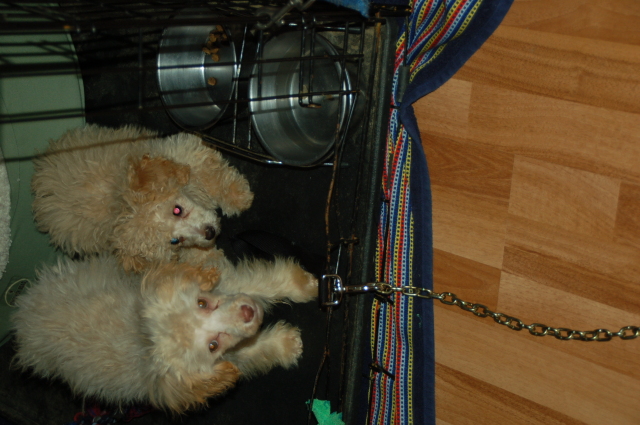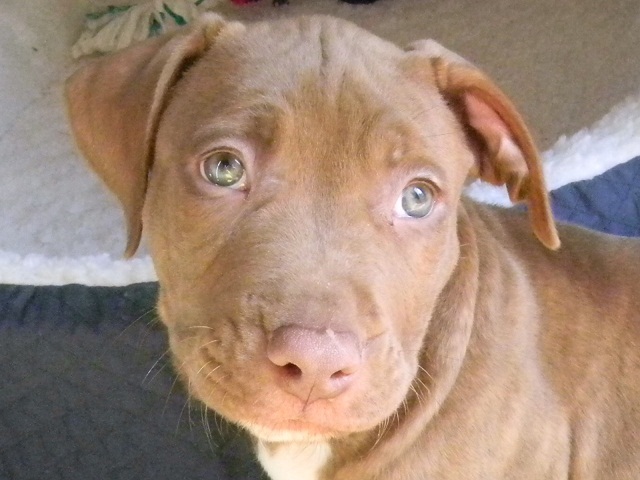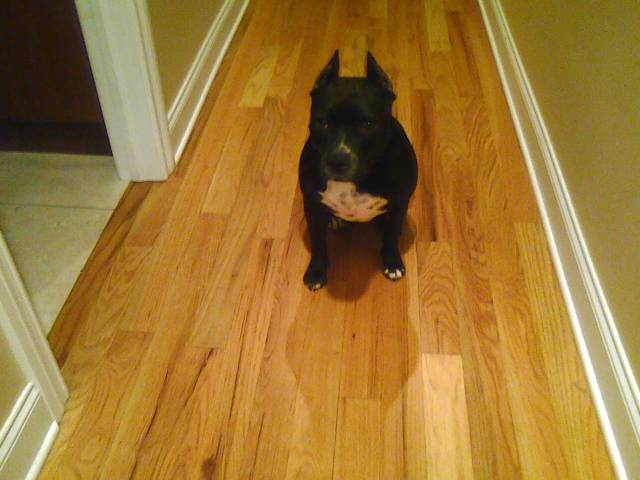QuestionHi, we just got a new puppy for Christmas, he is now 10 weeks old. We have had dogs before and we still have a 10yr old mixed breed. So I think I am doing everything right, my 10 year old is a wonderful dog and we've had him since he was a pup. Anyway our new puppy is great except he hates his crate, I have eased into it only using it minimally, I am a stay at home mom so I am only gone 20 min in the am and 20 min in the pm to take my kis to school. Every time I leave the house I crate him and every time he pees/poops in the crate and then makes a mess of himself in it to the point he needs a bath. What do I do?
AnswerIt is only natural that a puppy resists its crate at first. What the puppy
wants more than anything else is to be with others, you, anyone else in the
household, and any other pets. In our modern society, even if we are home,
other things distract us from the attention an uncrated puppy must have. The
only real solution is to crate the dog when you aren't around. Leave it some toys. Perhaps a Kong filled with peanut butter. Don't leave anything in the crate the dog might chew up. Rather than relaxing and catching a nap in their den, some puppies protest by fouling the crate. I haven't had this problem, but I see many questions suggesting it, and saw my daughter fight the problem.
A wire grid in the bottom of the crate will help keep the puppy up out of urine and to a lessor extent stools. They are available with the crates, but expensive and hard to find. A piece of closely spaced wire closet shelving from a home supply place is cheaper. This reduces the mess, making the protest much less effective. The longer haired the puppy, the higher it needs to be. In warmer weather, you can just haul the crate out and hose everything off. When the puppy sees you coping with the situation, and you stand your ground, most of them give up and learn to relax, and that you will return. One more thing that may help is using a smaller crate, or blocking off part of a larger one so the puppy can't fouled one spot and retreat.
The "shut the puppy in a safe room" is a fallacy. Very few houses even have a
safe room. How many of us have a room with a hard surfaced floor and nothing
else? Most rooms have electrical cords to chew if nothing else. In addition
to destroying anything a bored puppy finds to chew, it may choke or have
intestinal blockage from the pieces. I had a friend that left her dog in a
"safe" room. It ate a hole in the floor covering. The safe rooms fail to
give the dog the comfort of the enclosed space their instinct requires. Nor
do they restrict activity extending the time the dog can go without relieving
itself.

 Temperature before birth
QuestionQUESTION: My female cheweenie is on day 52 of h
Temperature before birth
QuestionQUESTION: My female cheweenie is on day 52 of h
 puppy behavior
Question
Cooper and Guy
Hi, thanks so much for reading
puppy behavior
Question
Cooper and Guy
Hi, thanks so much for reading
 10 week old Pitbull Pup
Question
Ares
I have a few questions =]
Why does he ke
10 week old Pitbull Pup
Question
Ares
I have a few questions =]
Why does he ke
 TRAINING POMERANIANS
Question
chichi&coco
I have two Pomeranian-mixed do
TRAINING POMERANIANS
Question
chichi&coco
I have two Pomeranian-mixed do
 AmStaff Terrier
QuestionMy dog
QUESTION: I have a 2 1/2 year old
AmStaff Terrier
QuestionMy dog
QUESTION: I have a 2 1/2 year old